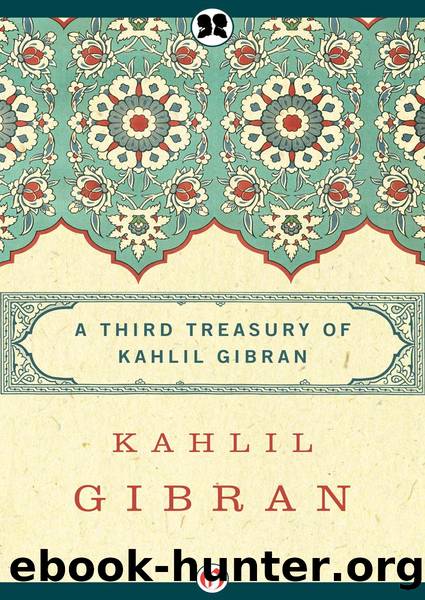Third Treasury of Kahlil Gibran by Kahlil Gibran

Author:Kahlil Gibran
Language: eng
Format: epub
Publisher: Philosophical Library / Open Road
The Essence of Poetry
TRUTH, THE GOAL OF POETRY
In the history of high learning, poetry has become part of the “liberal arts” and especially of rational philosophy ever since Aristotle included it in logic. Poetry is not a vain work of imagination, but an intellectual art; and though the weakest form of argumentation, poetry by its essence aims at disclosing truth and leading the reader to truth. As Heidegger says, poetic thinking is “the foundation of truth” (Stiftung der Wahrheit).1 This is also the objective of Gibran the poet. The poet in the writings of our author appears as a conscientious mind who knows that he has a mission to accomplish among his fellow-man. His duty is to teach “truth” which “is the will and purpose of God in man.”2
In what way does poetry convey truth? According to the traditional answer given by Aristotle, the poet presents his truth in terms of images, metaphors and similes, for men naturally delight in images.3 Gibran too as a writer uses the means of representation, imitations and parables in such a pleasing manner that he leads one to agree with his philosophical judgments. Yet, the images he uses are not empty entities. Rather, I should say, Gibran describes poetically the historic events of reality in view to induce the reader to perform an action. As such, though the style of Gibran belongs to the movement of romanticism, the content of his stories reminds us of the “realist.” Like Kafka, Sartre, Camus … Gibran’s heroes live in a concrete situation and at a certain period of the Twentieth Century. They are committed and engaged in the political, religious and social ideologies of the contemporary world. It is important to bear this in mind for it proves that literature according to Gibran ceases to be mere fiction intended to embellish romantically life situations. The difference between romanticism and realism lies in their difference of approach to the existential world of man. The former uses a style, form and content heavily imbued with self-obsession. The romantic poet simply writes about his egoistic inner struggles and sufferances with almost no heed of what goes on outside of him. On the other hand, the realist hardly speaks of life in the first person; his literature is an impartial description of life endured by concrete individuals in as many idiosyncratic ways. Such approach makes literature committed (engagée, would say Sartre) in helping mankind in its present predicament.
Also Gibran’s poetry fulfills the second principle of poetry stated by Aristotle. That is, poetry has the obligation to represent good human action as good and bad human action as bad. Aristotle writes:
The objects the imitator represents are actions, with agents who are necessarily either good men or bad—the diversities of human character being nearly always derivative from this primary distinction, since the line between virtue and vice is one dividing the whole of mankind.4
Gibran, too, in his attempt to represent human action presents a judgment bearing on the morality of these acts. These
Download
This site does not store any files on its server. We only index and link to content provided by other sites. Please contact the content providers to delete copyright contents if any and email us, we'll remove relevant links or contents immediately.
| Diaries & Journals | Essays |
| Letters | Speeches |
The Rules Do Not Apply by Ariel Levy(3899)
Bluets by Maggie Nelson(3705)
Too Much and Not the Mood by Durga Chew-Bose(3690)
Pre-Suasion: A Revolutionary Way to Influence and Persuade by Robert Cialdini(3404)
The Motorcycle Diaries by Ernesto Che Guevara(3326)
Walking by Henry David Thoreau(3228)
What If This Were Enough? by Heather Havrilesky(2943)
The Day I Stopped Drinking Milk by Sudha Murty(2852)
Schaum's Quick Guide to Writing Great Short Stories by Margaret Lucke(2797)
The Daily Stoic by Holiday Ryan & Hanselman Stephen(2703)
Why I Write by George Orwell(2355)
Letters From a Stoic by Seneca(2330)
The Social Psychology of Inequality by Unknown(2305)
A Short History of Nearly Everything by Bryson Bill(2131)
Feel Free by Zadie Smith(2095)
Insomniac City by Bill Hayes(2080)
A Burst of Light by Audre Lorde(1979)
Upstream by Mary Oliver(1931)
Miami by Joan Didion(1877)
